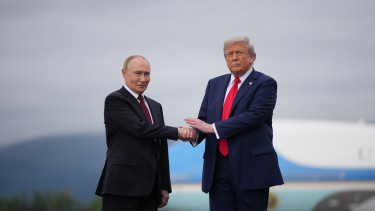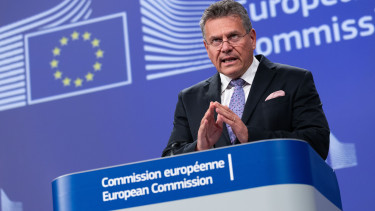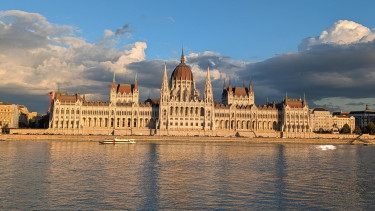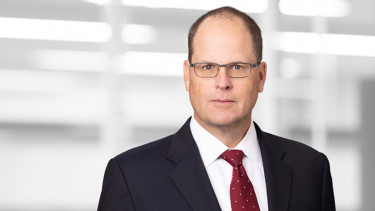E.ON ready to invest EUR 1 billion in Hungarian grid, but needs predictable regulatory environment

Highlights of the interview
- E.On Hungaria set aside roughly EUR 1 billion for investment in Hungary for the coming years
- A predictable regulatory environment is a key factor for the group.
- There’s a “highly constructive” relationship between the company and the government.
- Talks about the future of steel works Dunaferr have not yet yielded a solution after having to essentially give away electricity for free.
- Related losses for E.On amounted to millions of euros in double-digit territory.
- Würzberg is confident that the situation will be resolved, as well as that all residential solar customers who signed up before the deadline at the end of October last year will be connected to the grid before the end of 2023, and he reassured them that they will not miss the balance settlement.
- Other topics discussed in the interview include E.ON Hungária's business strategy, the issue of divesting from Russian gas, the possibilities for further energy savings and a number of issues related to renewable energy investments.
- In Würzberg’s view, the energy crisis is not over yet and thinks that "prices will not fall back to pre-war levels, we will have to live with higher energy costs in the future."
Portfolio: The German-Hungarian Chamber of Commerce and Industry has recently published its business report based on the responses of companies with a German background operating in Hungary, such as E.ON Hungária, which covered a number of topics. What do you think, for example, about the report's message that companies with a German background feel that there are growing problems with the predictability of legal and economic policy-making in Hungary?
Guntram Würzberg: It is important to pay attention to this phenomenon. If industrial companies have more criticism in these areas, it should not be taken lightly. As an energy company, we have a very constructive relationship with the government, and specifically with the Ministry of Energy. The dialogue between us is ongoing and constructive.
At the presentation of the report, the President of the Chamber also indicated that German companies sometimes feel that special taxes are discriminatory, and that the unpredictable changes in the tax policy cause problems, and this issue may also affect E.ON. What are your views on this comment?
Attention must be paid to the predictability of regulation.
This is true not only for taxation, but also for all government regulatory decisions in general, and we have asked for this in previous negotiations. It is understandable that no business is happy to be burdened with extra taxes, including energy companies. What we are asking for is a predictable investment framework, so that we can make the necessary investments accordingly.
The President of the Chamber also noted during the presentation of the business report that these days companies have to start every morning with the Hungarian Gazette to find out what decree was published the previous night, and government decisions affecting E.ON Hungária as an energy company have also been published in this way in the recent period. So how do you assess predictability in the energy sector these days?
As the operator of the electricity grid in Transdanubia and the Central region, the grid is our most important business, it accounts for more than eighty percent of our annual revenues. Electricity supply is a regulated activity, our revenues depend on the tariffs set by the state; therefore a predictable regulatory environment is a key factor for us.
Our aim is to spend a significant amount of money on grid development in the coming years because we see the need to implement the energy transition, so that more renewable capacity can be connected to the grid.
These investments, however, depend on a predictable and reliable regulatory framework, so if that changes overnight, as you implied in your question, that is a problem.
I would like to stress that we are ready and able to make the investments, as our Group has recently announced that we will invest 33 billion euros on the European level over the next five years, and we will allocate a substantial part of this to Hungary. But you have to know that within a group like E.ON, there is competition as to where the investment resources go, whether they come to Hungary or go to Germany, Czechia or elsewhere in Europe. These countries face similar network challenges, so reliable investment conditions are indispensable to obtain funds.

Last October you held a presentation at the Portfolio Energy Investment Forum conference, and in a winter interview you also worded the same message that you want to invest in the grid, but only if you can count on fair tariffs and fair regulation. More than half a year later, do you still hold this key message?
Yes, but I say this as a positive message.
We have earmarked roughly 1 billion euros for investment in Hungary in the coming years from the budget I have just mentioned. The spending of that remains subject to reasonable and fair investment conditions, which are in place now, but we also need them to be there in the future.
Wherever I go, I think it is very important to say this, because the realisation of these investments is not only in our interest but also in the interest of the customers and the country.
Under a recent government decree, the Distribution System Operators (DSOs) will receive HUF 100 billion from the Overheads Protection Fund to contribute to their network development costs. How do you view this decision?
It has already been talked about for quite some time at industry level that we would receive this funding, and I highly appreciate that this decision has finally been made.
What is the background to this decision?
Last year witnessed a huge increase in the amount of so-called network losses, which resulted from the fact that network operators also have to buy power from the market to keep the voltage stable on their own distribution networks. But prices on wholesale markets have skyrocketed, causing the cost of network losses to nearly double. This is why this decision was necessary, as the network tariff, which primarily covers the cost of maintaining the infrastructure, would not have been sufficient to manage the losses.
Although the increase of the network tariff this year and the additional resources still do not fully cover our losses, we now consider this decision to be in the right direction.
After this year's compensation, what do you expect in the coming years?
The war-induced energy crisis has made the market much more uncertain than it was before, making it difficult to predict things. Last year was certainly an extraordinary year, not only because energy prices skyrocketed, but also because they changed significantly from day to day, and there was no longer any predictability. We are now seeing a significant drop in wholesale electricity prices, but we do not know whether the market will stabilise. It depends on a number of factors, such as weather conditions, gas prices, and the war in Ukraine.
Talking about a new energy world, how do you assess the energy situation in Europe? We are a little more than a year after the outbreak of the Russian-Ukrainian war and hopefully past the acute phase of the energy crisis. You mentioned that electricity prices are reducing. So can we now be happy that the energy crisis is over?
We cannot be happy because we are not over the crisis yet.
E.ON is one of those who say that the crisis has not yet ended, that prices will not fall back to pre-war levels and that we will have to live with higher energy costs in the future.
The European Commission is trying to address the so-called energy trilemma, that is the triple challenge of affordability, sustainability and security of supply, of which security of supply, for example, has not been an issue at all over the last decade. The crisis is accelerating the energy transition, the point of which is how we replace fossil fuels with sustainable, green energy. Energy independence has also become a key issue on the continent, thus policy makers remain very active, not only in Hungary but also in Brussels.
You mentioned the issue of security of supply, and if we focus on Hungary, how do you see this topic? One of the main questions of the last year was whether gas would come from Russia or not. So how do you see the issue of diversification in Hungary?
It is a historical fact that Hungary is heavily dependent on Russian gas, and it is understandable that a system that has been in place for decades cannot be changed overnight - the situation is similar to that in Germany. However, it is never good for a country to be too dependent on a single player. So dependence on Russian gas must be reduced.
Now Hungary is already in a much better position than it was in previous years because of the development of international gas connection points. But still, gas has to come from somewhere, and I see that the industry is working on finding a solution for this, although E.ON is no longer involved in gas transmission.
Russian gas diversification in Europe is therefore still not solved. Last year, we were quite lucky with the weather, because we did not have such a cold winter, and our customers used significantly less gas; also we exceeded the fifteen percent gas saving target set by the European Commission.
With regard to gas saving measures, is there still a buffer in Hungary to save energy, or do you see any limit, for example in industry, in energy-intensive sectors?
It depends. If you look at energy-intensive industry sectors, it is difficult to save gas there because in many cases you would have to cut back production.
Household gas consumption can of course be reduced; it also depends on personal choices.
However, smart energy solutions that improve cost-effectiveness are also available both on the business and residential side to replace part of gas consumption with electricity - for example by installing solar panels or modern cooling and heating systems. It is also important to set an example: we at E.ON reduced the heating temperature by two degrees in winter, which was not pleasant for our colleagues, but we did not die from it and it was an important, symbolic step on our part.

What are the main energy risks for E.ON at the European level right now?
The main risk is that we miss the opportunity for growth.
What do you mean?
The main challenge of the current crisis is to achieve energy independence, but it also opens up huge opportunities for the energy industry. In the near future, there will be much more renewable energy used by everyone in Europe, and we need to prepare our power grids to make this possible. Grid development needs money: in addition to our own investments, we need public funds, both at EU and national level.
If we miss out on this development opportunity, the spread of solar PV systems, for example, will slow down and it will take longer for Europe to recover from the crisis.
There will be significant demand also from our customers for smart, sustainable energy solutions due to the energy transition - installation of solar panel systems, green energy, and the adoption of electric heating and cooling solutions. There is tremendous growth potential in this also and we need to serve our costumers well. We are ready to play a major role in this work.
You became CEO of E.ON Hungária last summer. Based on the time that has passed since then, how do you see it: what are the most pressing challenges for your business activities in Hungary now, what are the main challenges that you have to deal with?
Let me start from the perspective of our customers. Before I arrived here, in February last year, shortly before the outbreak of war, we had exited from the universal service market. This means that we handed over roughly 2.5 million customers to MVM. This fundamentally changed the way we operate, even though we remained in contact with these customers as a network operator. Although we have legally closed the transaction, we are still providing certain services to MVM on a temporary basis, for example on the customer service side. It is important for us to be able to close the transaction in practice, too.
What have you done since the legal closure?
Our business portfolio now has two pillars. In our service area, we operate electricity and gas networks for almost 4 million residential and business customers. We also provide advanced, sustainable and forward-looking energy services to residential and business customers across the country to help them create a more sustainable lifestyle or business for themselves.
What other key challenges do you still face?
Our main challenge, as I mentioned, is network development.
Just one example: we need to almost double the number of existing substations by 2030. This is essential to address our other challenge, which is related to solar power plants and grid connection. As you can see, the rise in energy prices and changes in the regulatory environment have led to a huge demand for solar panels last year, both from households and industrial customers. Last year we received as many new applications for solar PV connections from households as the total number of such systems connected to the grid in the previous ten years - 130,000.
How can you manage the latter challenge, given the huge number of new applications for connections that you received until the end of October last year? Are you able to manage this or do you face challenges, for example regarding the number of solar panels available and in the area logistics?
We need time, but we can do it. We are trying to mobilise all resources to deal with the situation, but we also have to be honest that it is not an overnight process. Our plan is to meet this year the demands that we have received, but it is important that we communicate with our customers so that they know what to expect.
Do you want to clear the backlog by the end of this year or earlier? Because of the balance settlement, the schedule does make a difference.
We want to work it off not by the end of the year, but during the year. Our customers do not have to worry about missing the balance settlement.
Last autumn brought challenges for energy suppliers not only in the residential segment, but also in the business segment due to soaring energy prices. What have you seen on the corporate side, what was your main experience?
The increase in energy prices, but even more so the volatility of prices, has brought significant changes in the contractual conditions in this market. One is that, contrary to previous practice, we have concluded contracts with customers for shorter periods. At the same time, due to volatility, we have moved from fixed price agreements to indexed pricing following up on price movements. In addition, for greater payment security, in some cases we have requested payment in advance, which will be credited later.
Overall, this is also beneficial for our customers because they now also have more flexibility in the changing energy market situation, because we can see that prices have been decreasing recently and so have their costs.
What other trends do you see in the corporate segment?
Many are moving towards green, sustainable operations, such as installing solar panels and heat pumps, and starting to use energy efficiency management systems. This is true for smaller companies as well as for large international corporations, the latter of which also have specific sustainability targets within their own group of companies, which they must achieve in Hungary, too.
Overall, what I see in the corporate segment is that the energy-only model has been completely transformed, a business has emerged that is based on sustainable, flexible solutions, and that's where we want to grow. So, we see huge growth potential also in this area, what we call customer solutions.
In the turbulent energy market environment of last autumn and winter, there were reports that E.ON did not offer prices, for example, to certain players in the SME sector, and thus lost customers. Do you have plans to win back these companies?
We have indeed lost customers, but the cooperation with the ones we have kept - because we have managed to convince them of these flexible contractual frameworks - is much more fruitful for both parties.
We will only seek to win back customers serving of whom will be beneficial to us.
This is a consequence of last year's energy crisis and the high prices to which we had to adapt. So, we will not hold on to the contracts of all our customers if they are causing us losses.
So, if I understand well, profit targets are particularly important in these challenging times?
Profit targets are as important to us as they are to any other company. For us it is key to be able to implement the network improvements and sustainability investments that I mentioned. We cannot do these without profit.
Talking about network development, E.ON announced at the January project kick-off that it will carry out 15,000 small and large investments by 2026 as part of its EUR 74 billion network development programme. This is a huge number, but, given the grid connection freeze ordered in the residential and industrial solar segments, the question that arises is whether the grid problems are so widespread that a nationwide grid connection freeze had to be imposed, or whether the problems are more regional and are concentrated in specific areas.
In most cases, we are talking about regional network differences, but in reality we are facing a general challenge that affects the whole network.
In fact, most of the grid was built fifty to sixty years ago, so in many areas the grid elements have reached the end of their useful life, so upgrades are needed even without the solar boom. The latter therefore adds to existing challenges and requires flexibility, especially at substations. All of this requires grid upgrades in general, and in addition there are the large industrial investment plans, such as project plans in the battery sector, which need to be looked at separately from a grid connection perspective. Coming back to your question, the network challenges that you mentioned arise all over the country, so the reaction, the national stop, is also coming from that.

Speaking of large industrial units, and you mentioned the importance of predictability, what was your experience with Dunaferr?
It is a complex matter, as the difficulties of the plant are well known. We have been painfully affected, as a government decree has forced us to provide electricity essentially for free since Dunaferr did not have a contract.
We have suffered losses of well into double-digit millions of euros as a result.
On the one hand, the political intention to save the plant and jobs is understandable, but the fact that they are involving the financial resources of a company that has nothing to do with the matter is a serious problem for us.
Does this loss-generating situation still exist?
MVM has contracted with Dunaferr since April, but the magnitude of loss we are talking about is more than ten percent of our annual earnings, which is very significant and nothing we can just neglect. We have been in constant negotiations with the government for many months to find a solution to this situation and we will continue to do so, but for the time being there is no solution for our losses. I trust that there will be.
For us, this is important because, as I said at the beginning of our conversation, we need predictable regulation in order to invest and plan. We are also examining this issue, and the resulting loss, from this perspective: we are looking at whether the regulatory environment and the compensation for the work is appropriate overall.
Do you expect that there will be a compensation for this case?
Yes, we expect that our losses to be recovered, but the current tariff system is not suitable for this.
Is that why you have proposed a solution, so that the regulatory framework should be able to handle this?
Yes.
And do you expect the constructive dialogue you mentioned at the beginning of the interview to apply to this case?
Yes.
Coming back to corporate business solutions, what are the most sought-after solutions for industrial companies to save a lot of energy these days?
A lot of them are looking for solar panel solutions, for example in Debrecen BMW has just put out a tender, and in Győr Audi - where we jointly implemented Europe's largest roof-mounted solar park earlier - wants to further increase its solar power capacity.
In addition, smart urban energy solutions are becoming increasingly popular: we are already working with Szolnok on this: we have installed solar panels on the roofs of public buildings and car parks, which feed e-chargers and help reduce energy expenditure. We expect more towns to follow this example in the future.
A third area is that we can offer companies that want to go green a Green Cloud solution in partnership with a private company. This will give our customers access to more renewable electricity from solar power plants in Hungary, and we will supply them with the surplus energy they need.
Are you also thinking about acquisitions in the energy segment in Hungary, or are you satisfied with your current situation?
We don't have any specific acquisition targets in mind right now. We always keep our eyes open, if a good opportunity comes up, we will of course look into it.
What is E.ON Hungária's business outlook for this year and the coming years?
Hungary is part of the E.ON Group's growth story, we are a strategic pillar within the Group and our business model is sustainable.
If we can enhance the network and grow in our customer solutions business, we will continue to have sustainable business operations. The crucial factor here is whether the regulatory framework is in place to secure that. We want to develop the network, to satisfy the needs of our customers, to contribute our energy to building a more sustainable future. "Our energy for a more sustainable tomorrow" - this is also our company’s mission statement.

Photo and cover photo: Ákos Stiller, Portfolio











